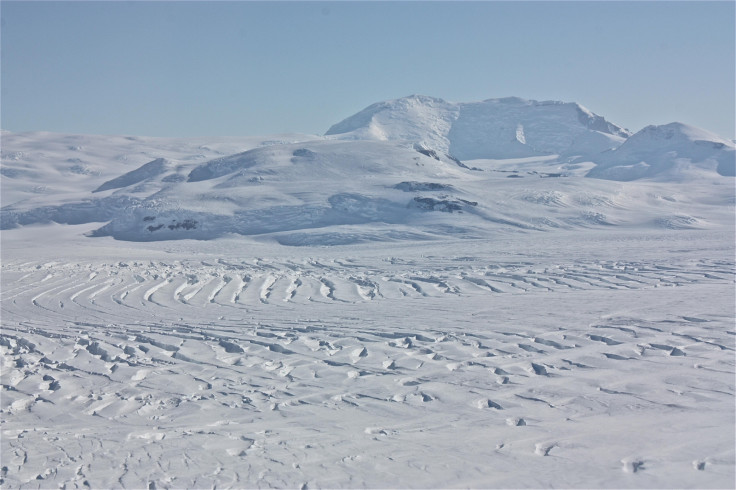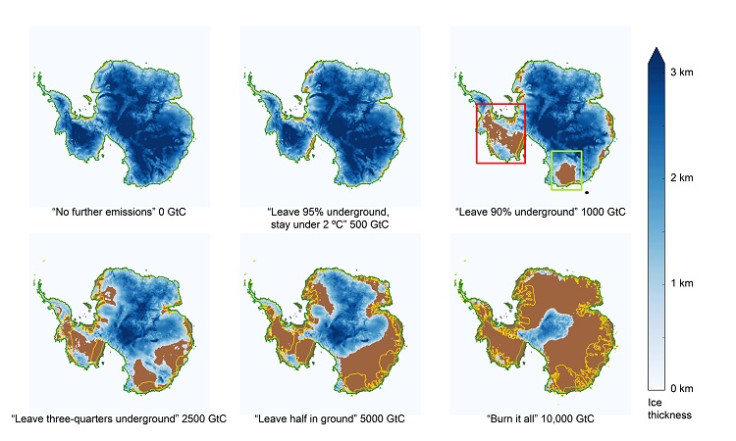Burning all Earth's fossil fuels would eliminate Antarctic Ice Sheet and cause 200ft sea level rise

If we were to burn all of the remaining fossil fuels on the planet, the Antarctic Ice sheet would melt entirely and the global sea level would rise by as much as 60m (200ft), a study has found. While this is not expected to happen any time in the near future, the researchers said their findings are a poignant reminder that mankind cannot continue to take fossil fuel from the ground and dump it into the atmosphere.
The researchers, from the Carnegie Institution for Science and the Potsdam Institute for Climate Impact Research in Germany, were looking at the response of the Antarctic ice sheet to a range of future carbon emission scenarios stretching into the long-term – most studies normally look at periods in a shorter timescale.
Their findings, published in the journal Science Advances, showed that if all the remaining carbon resources – thought to be around 10,000 gigatones – were burned, the Antarctic Ice Sheet would be eliminated completely and the sea level would rise by between 50-60m (160 to 200 feet).
Lead author Ricarda Winkelmann and colleagues said there are a complicated array of facts involved in the future of the Antarctic Ice Sheet. They used models to look at the ice sheet over the next 10,000 years. They found the West Antarctic ice sheet will become unstable under a business as usual scenario (were emissions continue at current rates) for the next 60 to 80 years. This represents just 6-8% of the remaining carbon locked into the planet's fossil fuels.
While their study did not look at specific timescales for the complete melting of the Antarctic Ice Sheet, Winkelmann said this is something they will continue to look into. She told IBTimes UK: "We're investigating changes in Antarctica on various timescales – we did so in the past, and we'll continue to do so in the future ... If we continue burning fossil fuels the way we did so far, at some point in the future we will have burnt them all - which would result in completely melting Antarctica.

"The mind-boggling point is that what we do today is triggering changes that continue for thousands of years to come. The sea-level rise from melting Antarctica would change the face of our planet and affect many, many generations to come."
She said the overall message was that it was imperative to keep fossil fuels in the ground: "If emissions keep on increasing the way they did up to now, already in the second-half of the next century or so we might have reached the 10.000 gigatons C cumulated emissions mentioned in the study. This is a simplification of course, because increasing scarcities would drive up prices etc., but it illustrates that 'burning it all' is not just a crazy idea."
The team also found that if global warming does not exceed the 2C temperature rise world leaders believe will prevent the worst effects of climate change, Antarctic melting will result in sea levels rising by a few metres, which would be manageable.
Speaking about the forthcoming climate change conference COP21 which will take place in Paris in December, Winkelmann added: "If decision-makers would reduce greenhouse-gas emissions in a way that confines global warming to below 2C, long-term sea-level rise could indeed be limited to a few metres. From the perspective of Earth science, it is still possible to keep the temperature rise below the 2C line. Moreover, the recent report of the IPCC on mitigation, compiled by many renowned economists, indicates that we have a number of different options, and that decarbonisation would certainly be difficult but feasible and affordable."
© Copyright IBTimes 2025. All rights reserved.





















